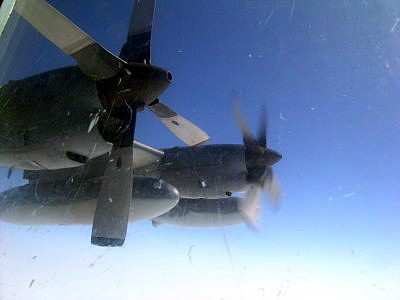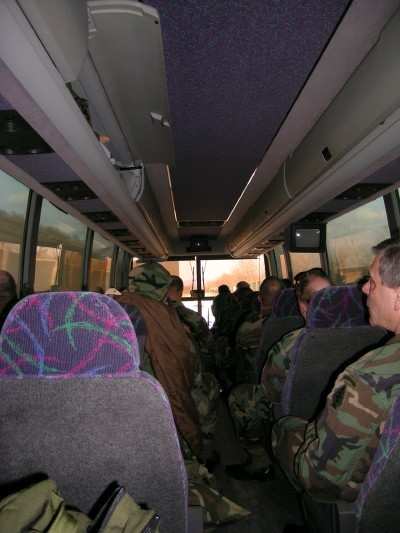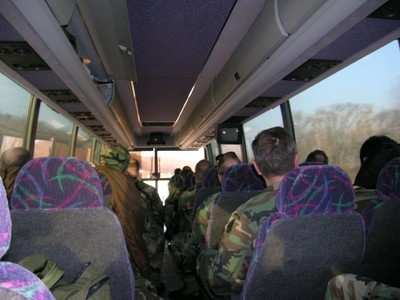Hognose Investigates The Engine-Out Passenger Experience
By Senior Correspondent Kevin "Hognose" O'Brien
I recently had an argument with another aviator about some
recent news stories that hyperventilated over a couple of recent
incidents wherein 747-400 operators, notably British Airways,
secured a misbehaving engine and continued on to their destination
rather than turning back or finding an alternate. He more or less
agreed with the news stories, and was willing to hang the captains
by their thumbs (which hasn't happened).

I countered with the facts as I understood them: a single engine
out on the 747-400 not only didn't compromise any systems, it
doesn't even compromise the redundancy of any systems. A 747 can
even go around on ONE engine. And for a number of reasons it can be
safer to continue on than land -- depending of course, on why you
shut the engine down.
If it turned into a parts-spewing turbo-grenade, that's one
thing. If you had a surge, high EGT, or low oil indication, that's
another.
Most lines' ops manuals cover three-engine operations of the big
jumbo as routine, not even considering them emergency operations.
There are three-engine performance charts in there. Part 121 says
it's the captain's call --he can land or continue at his
option.

"Well, if you were a passenger, how would you feel?" I wasn't
that interested in answering his question. How would I feel? Beats
me. Given the rarity of engine-out incidents, I didn't expect I'd
ever be in such a such a situation.
Fast forward about two weeks.
I had an ideal Guard weekend ahead. It was about to snow in
western Massachusetts -- a perpetuation of the ongoing white-out
that has been the Northeast most of this winter -- and we were
taking an extra day to make sure the mission was a success. We were
to fly to Key West, FL, conduct a parachute jump into the warm
caress of the Caribbean Sea, and swim around and play with boats
and kayaks for a couple of days. For the first time in months, we
packed sunscreen (being from western Massachusetts, most of us had
to order it online).
The first indication that things would not go well is when the
CO cornered me. "Did you get that surgery yet?"
"Er, ah, well..."
"You know what the doc said. You get the surgery before you jump
again," he told me. That was just before he scratched me off the
jump manifest. I could still do the playing with boats stuff.
Okay only one of us gets to be Boss, and it's him, and I'm cool
with that, even though I wanted to jump.

Then we walked out to our plane and boarded. The aircraft was an
MC-130P Combat Shadow from Eglin AFB and its green skin looked out
of place next to our mountains of snow. But soon we would be in its
native environment, Florida. We felt sappily happy. I was also
reassured by the spotless condition of the plane inside. Somebody
-- or a lot of somebodies -- clearly took pride in this machine(the
Combat Shadow is a C-130, mechanically similar to the E model, but
it has some special fitments to make it suitable for its main
mission, refueling Air Force special operations helicopters).
The euphoria lasted about forty-five minutes. And then we heard
a sound we'd often heard before. The difference is, every time we'd
heard the sound of an Allison T56 spooling down before, we were on
the ground AFTER the flight. And that sound had never been
accompanied by a palpable deceleration before.
The word was quickly passed. "We've lost an engine, we're going
to land." But after a time we didn't do that, and the crew seemed
pretty calm about it. I talked to one of the crew members. The
number two engine had suddenly seemed to lose a large quantity of
oil, and the crew had preemptively shut it down.
The decision on where to take the plane hinged on what was safe,
legal, and best for accomplishing the mission. While continuing to
Key West was feasible and safe, the plane would then be stuck in a
place with no local C-130 parts or experience, and an unknown
engine problem. Since flying with three engines is legal, but
taking off with three isn't, it looked like a longer-than-forecast
Key West vacation.
It turns out the guy I talked to was the right guy to talk
aviation with -- he not only was qualified in a couple different
positions on the 130, but in his civilian life was a flight
engineer on cargo 747-200s. He had a couple of good engine-out
stories, including an uncontained fan disk failure on takeoff at
Guayaquil, Ecuador -- a much hairier situation that the
precautionary shut-down we endured.

The crew finally chewed over not one, but a couple of
alternatives: Pope AFB in Fayetteville, NC, and Harrisburg
International Airport in Pennsylvania. At Pope, the engine could
certainly be fixed, but there was a major con to go with that pro:
Pope is a major "flagpole" command. Harrisburg is the home of the
193rd Special Operations Wing which flies EC-130 Commando Solo
airborne psychological warfare aircraft; they are in the process of
converting to new C-130Js, but their remaining C-130Es had similar
engines to our MC-130 so they would have mechanics and spares also,
and less bureaucracy and hassle than Pope.
In the end, though, Harrisburg won out. I haven't talked to the
aircraft commander so I don't know what factored into his decision.
(The EC-130J unit is probably worth a story of its own in the
future. During the war in Afghanistan, the information their
Commando Solo craft broadcast from its onboard radio and TV
transmitters was essential to getting the Coalition message across
to the Afghans).
As soon as we were on the ground, the troublesome number two
engine was being swarmed by a team of mechanics. As we walked out
of the back of the plane, they had already erected an engine repair
stand and gone to work. The American taxpayers might not be getting
their money worth from my unit this weekend, but they sure have a
right to be proud of their part-time Air Force men and women --
they are working awfully hard while we hang around and await The
Word.
The mission for the day was scrubbed. The Air Force, God bless
them, put us up in a decent hotel, from which I'm filing this
story, while their mechanics pulled the propeller and the engine.
They arranged to have another engine flown in, and we will likely
continue in the plane that brings the engine, and try to recover
what training value we can out of our interrupted drill, depending
entirely on timing.

So... how did I feel? Well, I was not too excited. Some of the
other guys were -- not all paratroopers are as confident about
airplanes as you might think -- but they calmed down pretty quickly
and soon were joking and cutting up as usual. I realize that we're
probably a more phlegmatic bunch than the average 747-load of
babies and grannies and everything in between, but from my
standpoint an engine shutdown remains no big deal.
Your mileage, as they say, may vary.
And Now... The Rest Of The Story
It turns out that the oil leak wasn't a simple external line,
but would require a teardown. So they were looking at an engine
swap to get the plane back to its home field, Eglin AFB. By the
time they got another C-130 to bring an engine in, it was 1530 the
day after the incident.
The good news is that there were more and better windows on the
new craft than even on the MC-130P (which has larger windows than
ordinary 130s, because of the refueling mission) -- and that was
the extent of the good news. The bad news was that the replacement
took us home --the Key West mission aborted -- into the teeth of a
snowstorm, and did it at what seemed like a whopping zero feet
AGL.
 ANN's Daily Aero-Term (12.13.25): Light Gun
ANN's Daily Aero-Term (12.13.25): Light Gun Aero-News: Quote of the Day (12.13.25)
Aero-News: Quote of the Day (12.13.25) NTSB Final Report: Gippsland GA-8
NTSB Final Report: Gippsland GA-8 Classic Aero-TV: Historically Unique -- Marlin Horst's Exquisite Fairchild 71
Classic Aero-TV: Historically Unique -- Marlin Horst's Exquisite Fairchild 71 Airborne 12.12.25: Global 8000, Korea Pilot Honors, AV-30 Update
Airborne 12.12.25: Global 8000, Korea Pilot Honors, AV-30 Update







